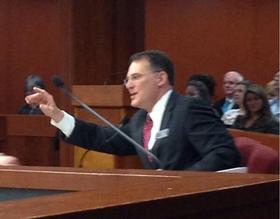Common Core Hearing Attracts a Crowd

A bill debated in the state legislature is so controversial, 68 people spoke about it at a House Education Committee hearing Wednesday. The bill aims to separate Georgia from the Common Core education standards. The legislation triggered passionate pleas on both sides of the issue.Hear the audio version of this story.
Sen. William Ligon (R-Brunswick) is sponsoring the bill, which has already passed the Senate. As he’s done several times this legislative session, he explained the bill’s purpose to the committee.
“What the bill does, it establishes an open transparent process for the review of our standards,” Ligon said. “It establishes an advisory council to work with the state board to determine what our standards would be.”
The bill also puts tight limits on assessment, data collection, and how Georgia should craft its education standards. That has some educators concerned. State Schools Superintendent John Barge told the committee his office worked with Ligon on the bill, but he couldn’t support it.
“The bill has quite a bit of language that would throw our education system into complete chaos, including the new teacher evaluation system that was placed into state law last year by this assembly, our waiver from No Child Left Behind, and a number of other issues,” Barge said.
Barge said the bill’s testing restrictions could cause the state to lose $1 billion in federal funds.
But, supporters of the bill say the issue is local control. Although the Common Core was developed by a consortium of states, including Georgia, the standards were tied to federal grant money. Some teachers and other supporters of the bill, like Julianne Thompson of the Georgia Republican Assembly, said that’s an overreach.
“There’s a reason national curriculum is prohibited by law,” Thompson said. “Let’s not try and get around that by the enticement by federal funds to conform. Control should be local, and the state, not the federal government, should be empowered.”
But speakers like Coni Grebel, a Lee County English teacher, said the Common Core has raised the bar for her students.
“I am one of the luckiest people around because when I wake up in the morning, I love my job,” she said. “And I didn’t always love it.”
Grebel said passing the bill would be taking a step backwards.
“I have tasted rigor,” she said. “Please do not send me back to mediocrity.”
Several speakers were concerned about possible unintended consequences of the bill. That includes restrictions on assessment, which prohibit the state from adopting Common Core-aligned tests. Some worried that would apply to college entrance exams, such as the ACT and SAT, which are aligning to the standards.
House Education Committee Chair Brooks Coleman said there will likely be several amendments to clarify the bill’s language.
“As the bill was crafted on the Senate side, I don’t know that it was crafted as it was here,” Coleman said. “And we’ll work with the senator and try to correct those concerns.”
Coleman said the amendments should be completed by Monday. The committee is scheduled to vote on the bill next week.
9(MDAxODM0MDY4MDEyMTY4NDA3MzI3YjkzMw004))








